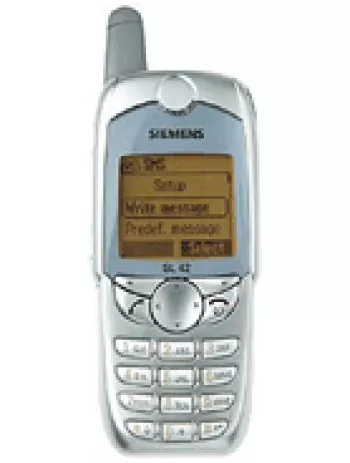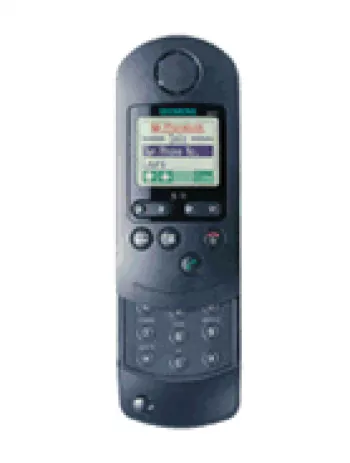
Network
The Siemens CL75 is a GSM phone that supported multiple network bands including GSM 900, 1800, and 1900. As it was a feature phone, it provided basic connectivity features which were quite standard for the time it was released. The inclusion of GPRS Class 10 gave users limited internet connectivity, although with no EDGE support, it was unable to handle high-speed data communications.
Launch
Announced in the first quarter of 2005, the Siemens CL75 was positioned as an entry-level device appealing particularly to those seeking a stylish and compact mobile phone. Despite its allure in design, its commercial life was short-lived as it was eventually discontinued, a common fate for many devices from that era due to rapid technological advancements.
Body
The Siemens CL75 was designed with a compact form factor, measuring 87 x 44 x 23 mm and weighing about 90 grams. This made it a portable device that could easily fit in a pocket or handbag. It utilized the Mini-SIM standard, which was the norm before the shift to Micro and Nano SIMs in later years. The robust design highlighted its appeal to consumers looking for a device that was both stylish and functional.
Display
Featuring a TFT display capable of showcasing 256K colors, the Siemens CL75's screen had a resolution of 128 x 160 pixels. This was modest by today’s standards but sufficient at the time for basic functionalities like texting, calling, and simple gaming. The rich color palette allowed for some vibrant visuals, especially when viewing images captured using its camera.
Memory
With an internal storage capacity of 11MB and no support for expandable memory cards, the Siemens CL75 was limited in terms of how much data it could store. This storage was often divided between system functions and user content like contacts and images. The phonebook could store up to 500 entries, each with 20 fields and photo-call capabilities, a sophisticated feature at the time. The device also kept records of the 10 most recent dialed, received, and missed calls.
Main Camera
The Siemens CL75 came equipped with a VGA camera allowing users to capture basic digital images and video. Though only 0.3MP, the camera was more of a novelty at the time, allowing users to capture spontaneous moments on the go. Image quality was limited, with most shots best viewed on the phone’s display rather than printed or shared widely.
Sound
The CL75 featured a vibrating alert system with downloadable polyphonic ringtones to personalize the device's audio alerts. However, it lacked a loudspeaker and a 3.5mm headphone jack, limiting its functionality in terms of audio output. This underscored its focus as a communication device rather than a multimedia one.
Communications
The phone did not support modern wireless features such as WLAN or Bluetooth, instead relying on infrared for short-range data exchange. It also lacked built-in GPS for positioning and did not feature an FM radio, which might have limited its appeal to some users. For connecting to other devices, it featured a proprietary USB connection.
Features
Despite its basic appearance, the Siemens CL75 included several software features. It supported multiple messaging formats including SMS, EMS, MMS, and even instant messaging which was gaining popularity at that time. The WAP 2.0/xHTML browser allowed for basic web browsing. Additionally, users had access to pre-installed Java-based games like "Angels & Clouds" and "C’est La Vie," with the option to download more.
Battery
Powered by a removable Li-Ion 780 mAh battery, the phone was engineered to provide up to 220 hours of standby time and up to 3 hours of talk time. While this might not compare favorably with modern devices, it was fairly standard given the phone’s feature set and hardware constraints.
Miscellaneous
Available in colors like Silk Flower Red and Pin Striped Black, the Siemens CL75 offered some aesthetic variety, aimed at appealing to fashion-conscious consumers. The design and color options played a significant role in customizing the user's identity and style statement in the mid-2000s mobile phone landscape.
Main Features of Siemens CL75
- Supports GSM technology
- Tri-band 2G capability (GSM 900 / 1800 / 1900)
- Compact and lightweight with dimensions of 87 x 44 x 23 mm and weight of 90 g
- TFT display featuring 256K colors
- Internal memory of 11MB
- VGA Camera with video recording capabilities
- Infrared port for wireless communication
- Supports SMS, EMS, MMS, and Instant Messaging
- Browsing via WAP 2.0/xHTML
- Java support with MIDP 1.0
- Removable Li-Ion 780 mAh battery
- Available in stylish colors: Silk Flower Red and Pin Striped Black
Drawbacks of the Siemens CL75
- No EDGE support for faster data connectivity.
- Discontinued status means limited support and availability.
- No expandable memory (no card slot), limited to 11MB internal storage.
- No front (selfie) camera available.
- No loudspeaker, impacting speakerphone functionality.
- No Bluetooth connectivity for wireless file transfers.
- No WLAN support for Wi-Fi connectivity.
- No GPS positioning features available.
- No radio functionality included.
- Proprietary USB connection limits ease of connectivity with modern devices.
- No 3.5mm headphone jack for standard audio output.


















View Also
More Phones
All Rights Reserved +14266 Phones © Mobilawy 2025

























